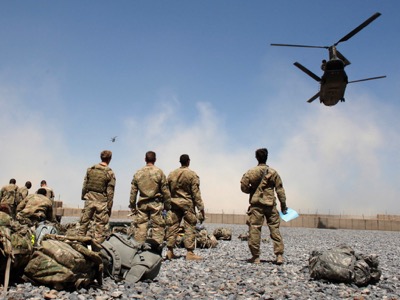The war in Afghanistan was officially launched to avenge the attacks of September 11, 2001. However, it had been prepared beforehand. For two decades, we have been explaining in these columns that it is the first in a long series of wars aimed at destroying all state structures in the broader Middle East (Rumsfeld/Cebrowski strategy) in order to control the exploitation of natural resources. The war, which was supposed to last two weeks, has been going on for 19 years. It is planned to last as long as possible. Today, personalities linked to the Pentagon are sabotaging President Trump’s partial withdrawal.

Hundreds of thousands of civilian casualties, more than 2,400 US soldiers killed (plus an unspecified number of wounded), about 1,000 billion dollars spent: this is the sum total of 19 years of US war in Afghanistan, plus the cost to NATO allies and others who have stood by the US in the war. Balance sheet of bankruptcy for the USA including under the political-military profile: most of the territory is today controlled by the Taliban or disputed between them and the government forces supported by NATO.
Against this background, after long negotiations, the Trump administration last February concluded an agreement with the Taliban which, in exchange for a series of guarantees, provided for a reduction in the number of US troops in Afghanistan from 8 600 to 4 500. This does not mean the end of the US military intervention in Afghanistan, which continues with special forces, drones and bombers. The agreement, however, would pave the way for a de-escalation of the armed conflict. But a few months after it was signed, it was broken: not by the Afghan Taliban but by the US Democrats. The Democrats passed an amendment to the Authorization Act in Congress that allocates $740.5 billion to the Pentagon’s budget in fiscal year 2021.
The amendment, approved on July 2nd by the Armed Services Committee by a large majority with Democrat votes, stipulates to "limit the use of funds to reduce the number of armed forces deployed in Afghanistan". It prohibits the Pentagon from spending the funds in its possession on any activity that reduces the number of US soldiers in Afghanistan below 8 000: the agreement, which involves reducing the number of US troops in Afghanistan, is thus effectively blocked. It is significant that the amendment was introduced not only by Democrat Jason Crow but also by Republican Liz Cheney, who is endorsing it in perfect bipartisan style [1] Liz is the daughter of Dick Cheney, Vice President of the United States from 2001 to 2009 in the George W. Bush administration, the one that decided the invasion and occupation of Afghanistan (officially to hunt down Osama Bin Laden [2]).
The amendment explicitly condemns the agreement, arguing that it undermines ’US national security interests’, ’does not represent a realistic diplomatic solution’ and ’does not provide protection for vulnerable populations’. In order to be allowed to reduce its own troops in Afghanistan, the Pentagon will have to certify that this "will not compromise the U.S. counterterrorism mission". It is no coincidence that the New York Times published an article [3] which, on the basis of information provided (without any evidence) by US intelligence agents, accuses "a Russian military intelligence unit of offering Taliban militants a reward for killing Coalition soldiers in Afghanistan, targeting mainly Americans". The news was broadcast by the main US media without any fake news hunters questioning its veracity.
A week later, Congress passed the amendment that prevents the reduction of US troops in Afghanistan. This confirms what the real purpose of the US/NATO military intervention in Afghanistan is: the control of this strategically important area. Afghanistan is at the crossroads of the Middle East, Central, South and East Asia. In this area (in the Gulf and the Caspian Sea) there are large oil reserves. There are also Russia and China, whose strength is growing and influencing the global base. As the Pentagon warned in a report of September 30, 2001 [4], a week before the US invasion of Afghanistan, "the possibility exists that a rival with a formidable resource base may emerge in Asia".
A possibility that is now materializing. US "national security interests" dictate that we must remain in Afghanistan, whatever the cost.
[1] En réalité, c’est l’ancienne conseillère de Sécurité nationale Susan Rice qui mène la dans côté démocrate. Comme elle n’est pas parlementaire, c’est le représentant Jason Crow qui a déposé l’amendement. Il s’était beaucoup impliqué dans la procédure de destitution du président Trump. L’accusation selon laquelle la Russie finance l’assassinat des GIs n’a aucun sens puisque le nombre de morts US en Afghanistan ne cesse de baisser. “Trump Puts Russia First”, by Susan Rice, New York Times (United States) , Voltaire Network, 1 July 2020.
[2] 9/11: The Big Lie, Thierry Meyssan, CreateSpace Independent Publishing Platform, 2002.
[3] “Russia Offered Afghans Bounty To Kill U.S. Troops, Officials Say”, Charlie Savage, Eric Schmitt and Michael Schwirtz, The New York Times, June 27, 2020.
[4] Quadrennial Defense Review Report, p.12, Department of Defense, September 30, 2001.

 Articles by this author
Articles by this author Send a message
Send a message
















Stay In Touch
Follow us on social networks
Subscribe to weekly newsletter